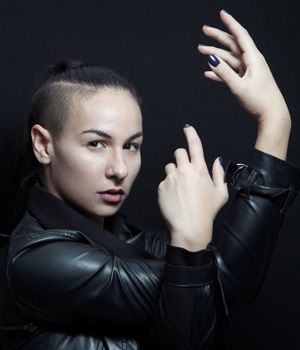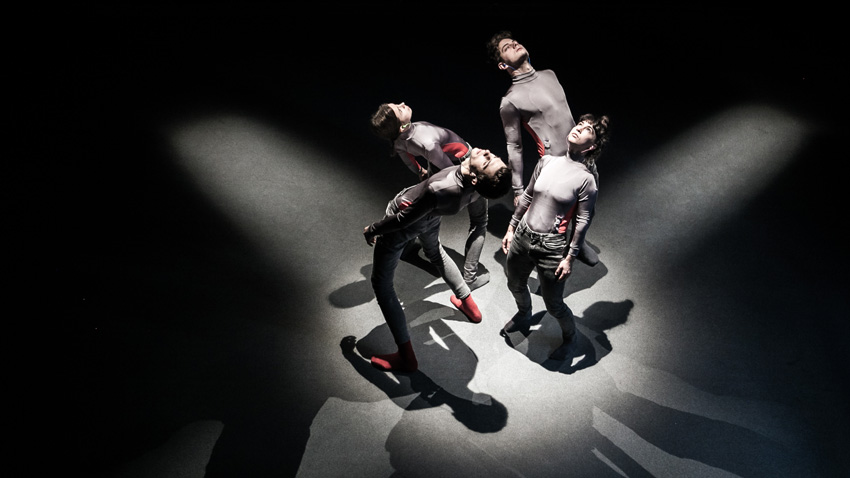On Dec. 7 and 8,“The Red House”Center for Culture and Debate in Sofia hosted the premiere of the show, “Jon, a play about the adopted”. It is the second social project supported by the platform for documentary art N/TRY. The partner in the project is the VOXPOPULIStudio for Documentary Theater. Radio Bulgaria talked to Stephanie Handjiiska, anthropologist, choreographer and contemporary dance performer. How was she attracted by the theme of adopted children? For her this theme puts the issue of beating prejudice:
 „In our experience,the spontaneous response of people is that this theme is about images of trauma coming from the homes for medical and social care. Theyvisualize sad children, with eyes full of tears, empty iron beds - all those clichés. We view adoption in a radically different way, dealing a lot more with the profile of an adoptive family. We have met with such parents, listened to their stories because, believe me, adoption does not end with taking a child from a place where he or she has received care. Adoption does not end either with the lawsuit after which the parent receives a legal status of a parent of this child. In an adoptive family the most important process is the process of adaptation between the parents and their child.”
„In our experience,the spontaneous response of people is that this theme is about images of trauma coming from the homes for medical and social care. Theyvisualize sad children, with eyes full of tears, empty iron beds - all those clichés. We view adoption in a radically different way, dealing a lot more with the profile of an adoptive family. We have met with such parents, listened to their stories because, believe me, adoption does not end with taking a child from a place where he or she has received care. Adoption does not end either with the lawsuit after which the parent receives a legal status of a parent of this child. In an adoptive family the most important process is the process of adaptation between the parents and their child.”
As Stephanie points out, adoption used to be a secret prior to the democratic changes in 1989. Adopted children though would often learn the truth in a traumatic way - from a “well-wisher”, a neighbor or friend.
„Today's adoptive parents have a different, healthy culture of communication. From the very first moment when they take their child from the social home they never start lying to him or her. Now there is more respect for children, even if they are too young,and we are free to present the truth about their origin to them openly and calmly, so that the family is not devastated. After all, a family based on truth and transparency is strong and united. So, working on the field we have come across the two extremes - growing in a family unaware that you are biologically different, on the one hand, and living with a full awareness of this fact from the very start, on the other.”
And, now - what stands behind the method “verbatim” (from Latin, “word for word”)? Why is it necessary to present verbatim the words of interviewees in connection with adoption?
„We believe in the 'verbatim' method as a direct way to convey to our audience a few voices which would otherwise remain silent. It represents interviews that are recorded in an audio format from which a few keyfragmentsare selected. They illustrate in a clear way the thesis of the respondent. We are also bound not to take these words out of their context.”

During the theater show actors listen to MP3 recordings using headphones and speak word for word and in a natural way. „We urge the actors to come as close as possible to the man or woman whose monologue they act, to his or her truth.”
Is there a miracle in adoption?
„These families are heroes, though unknown. They live in a very natural and generally good way, or at least this is my impression. Of course, I cannot claim this is the general case, but this is what we have seen talking to such families. Most importantly, for me their story is also a story of overcoming, especially where parents are concerned. They travel a path of overcoming their egos for the sake of a wonderful new family, and this I grade as a miracle. Believe me: I am very happy to see such things happening.”
English Daniela Konstantinova
Photos: private libraryA protest is being held tonight in front of the Ivan Vazov National Theatre against the premiere of the play Arms and the Man by Bernard Shaw, staged by John Malkovich , which will open at 7 p.m. "This play should not be staged at the National..
A Bulgarian production company will build a new film center worth EUR 15 million in the Sofia-Bozhurishte Industrial Park. The film center will span over 30,000 square meters. The contract for the sale of the land will be signed at the end of..
The first EU Songbook has been released, featuring six songs from each of the 27 EU member countries and Ode to Joy, the anthem of the European Union, reports BTA. The Songbook, a non-profit Danish initiative, has no financial ties to the EU,..

+359 2 9336 661
